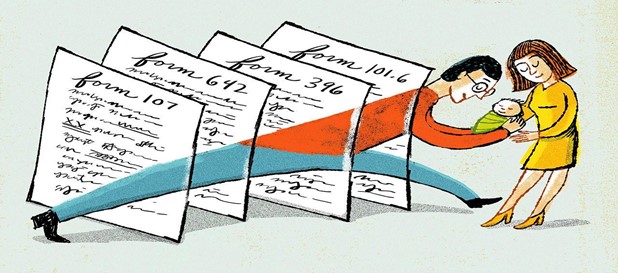Blogs
Your source to the latest insights on what's trending in the HR arena - Recruitment, Talent Assessments, Employee Surveys and Training.

Paternity leaves in India: A under-examined subject
The Central government of India by notification under Central Civil Services Leave Rule 551 (A) took measures to provide paternity leaves to its male workforce for the duration of 15 days to take care of their wives and newborn children. This leave must be availed either fifteen days before or within six months from the date of delivery. This law is applicable only to the public sector while there isn’t any law that mandates paternity leaves in the private sector.
Now, I would like you to stop and think for a moment, how many of us check out the paternity leave policy of an organization before joining? Your answer would probably be- not many of us. We examine hundreds of things about a company but we may leave paternity leave policy out of the list. That shows how under-talked the subject of paternity leave in our country is.
Be it a man or a woman, becoming a parent is special for both. A male employee would like to cater to his spouse in this crucial period and would like to spend quality time with his newborn child. India is ninety out of the one hundred and eighty seven countries within the world that has no national policies to confirm that fathers get enough paid leaves with their infants and partners, when they need them the most. In the present times, the new fathers have to work for almost 10 hours a day before they can spend quality time with their families. By that time, they are already physically and mentally exhausted enough to do anything productively, without 100% of their heart and soul in doing what they are doing.

While most of the companies headquartered outside India offer paternity leaves to their male employees, Zomato is the only Indian company known which offers a remarkable 26-weeks long paid paternity leave to its employees-an applaudable gesture by Zomato!
If you have this question in mind, what will the company get out of providing long paternity leaves to its employees, then please continue reading.
No access to paternity leaves or only 15 days long paternity leaves is a prejudice against men who would also like to spend time with their spouses and infants. Therefore, there is a high probability that during this period they are not bringing their full self and potential to work. They are most probably distracted and less motivated to work.
Benefits of Paternity Leaves to the Organization
So, what happens when a company offers provisions for the employees to be able to spend time with their partners and their infants? When a company shows compassion towards its employees, the employees feel it. When employees realize that the company cares for them, it gives rise to numerous positive outcomes: such as high employee engagement and employee satisfaction.

Moreover, providing paternity leaves promotes gender equality in both professional and private spheres. Men taking leaves to be dedicated fathers support women to heighten their own careers. According to a 2019 article by Mint, women’s representation in corporate India stands at 30%, moreover, only 11% are senior leaders. Research has shown, maternity leave taken by women has led them towards reduced chances of pay raise, receiving promotion and moving into management.
Seeing men as caregivers will aid in reduction of gender discrimination in the workforce, including the pay gap.
Furthermore, when a company takes steps to show kindness towards its employees it builds a positive brand for itself in the corporate world. For example, here, by providing equal parental leaves to both its male and female workforce and thus getting identified as an employee centric company, the company will attract a large pool of candidates willing to work for it.
But does this whole thing end with just providing paternity leaves to the employees? The answer is NO!
Low take up of Paternity Leaves by Men
Men across the globe have stated that taking leaves makes them lose face at the workplace. They fear that it will be assumed that they are no longer interested in work, that they are “slacking off”. According to these men, taking paternity leave in the middle of their tenure is seen as having a break; which brings with it the possibility of reduced chances of appraisals and promotions. The story goes, remaining committed to work makes you look professional and maintains respect in the eyes of the managers.
A study conducted by Dhawale and Sabale (2019), showed that the take up of paternity leave is the highest when the leaves are well paid. Those employees who took paternity leaves reported positive outcomes from the leave itself and positive responses from the social network with the exception of negative reports from the employers and colleagues (with a few positive responses too, of course).
This indicates that there is an important role played by the organizational culture with respect to whether an employee will take up paternity leave or not when offered.
Promoting the Culture of Paternity Leaves
Another question, what can organizations do to promote taking up paternity leaves among employees? One way is by acting as an example. The top management and mid-level managers should themselves reap the benefits of paternity leaves when the time comes and discuss how it benefited them with their colleagues and teams. This way the initial hesitation and the fear of being seen as slacking off will be lessened. Another way is by appreciating anyone who takes paternity leaves in front of everyone or via a common email sent to all employees of the organization. This will encourage expecting fathers to consider taking paternity leave without worrying about any possible negative effect this act might leave on their direct managers.
Most parents work to give children the best start possible, this should be supported by their respective organizations, shouldn’t it?
Conclusion:
To sum it up, paternity leave is a less focused upon topic in India. While women employees have support from the government in the form of mandatory maternity leave policy in both the private and public sector, men do not enjoy such support from the government and in the process have to deal with different sorts of issues and make hard decisions. Paternity leaves, therefore, should be more talked about and need to be highlighted to bring a change in the way they are being dealt with in the present times. It should be at parity with the maternity leave policy offered by the organization. A culture which promotes taking up paternity leaves should be encouraged. This will be beneficial not just for the employees but even for the organization at different levels. Signing off, hoping for a gradual change.
FAQs
1 : What is the current status of paternity leave policies in India?
Answer : In India, paternity leave policies are not uniformly mandated across all sectors. The Central government under Central Civil Services Leave Rule 551 (A) provides 15 days of paternity leave to its male employees. However, in the private sector, there is no legal mandate for paternity leaves, leaving it to individual companies to decide their policies. Some progressive companies do offer paternity leaves, but it's not a widespread practice.
2 : Why is paternity leave important for male employees and their families?
Answer : Paternity leave is crucial as it allows male employees to support their spouses during childbirth and postnatal care. It also enables them to bond with their newborn child during the critical early stages of life. This period is essential for establishing a strong emotional bond between the father and the child and supports the family unit during a significant life transition.
3 : How does providing paternity leave benefit organizations?
Answer : Organizations that offer paternity leave benefit in multiple ways. Firstly, it enhances employee engagement and satisfaction, as employees feel valued and supported by their employer. Secondly, it promotes gender equality in the workplace, as it acknowledges and supports the role of men in child-rearing. Thirdly, it can improve the company's reputation as a progressive and employee-centric organization, helping to attract and retain top talent.
4 : What are the challenges faced by men in taking paternity leaves?
Answer : Men face several challenges in taking paternity leaves. There is often a societal stigma and workplace culture that may view taking paternity leave as a lack of commitment to the job. Men may fear negative career repercussions, such as missed promotions or reduced opportunities for advancement. Additionally, the lack of widespread acceptance and awareness of the importance of paternity leaves contributes to low uptake.
5 : How can organizations promote a culture that supports paternity leaves?
Answer : Organizations can promote a culture that supports paternity leaves by leading by example. Senior management should utilize these leaves themselves and share their positive experiences. Companies can also provide awareness programs about the benefits of paternity leave and openly appreciate employees who take paternity leaves. Furthermore, incorporating paternity leave policies into the company's HR policies and ensuring they are as robust as maternity leave policies can also make a significant difference.
6 : What changes are needed to improve the uptake of paternity leaves in India?
Answer : To improve the uptake of paternity leaves, a multi-faceted approach is needed. This includes creating legal mandates for paternity leaves in the private sector, changing societal norms and perceptions regarding the role of fathers in child-rearing, and promoting awareness about the benefits of paternity leaves for families and organizations. Moreover, companies need to actively encourage and facilitate fathers to take these leaves without fear of professional repercussions.
Recent Articles
News Center


- India Today - 7 reasons companies ask for psychometric tests
- Business World - AI - The New Secret Sauce in Psychometric Assessments
- DNA - HR Trends for 2018
- The Hindu - Psychometric Assessment a "game changer" in hiring
- Entrepreneur - 9 ways to promote actionable feedback at organisations
- Human Capital - Looking Beyond Performance Appraisals
Top Trending Pages
- Best Employee Engagement Survey Company
- Executive Search | Online Assessments & Surveys
- Top Personality Assessment Providers in India
- Talent Search | HR Consulting | Recruitment
- Manager Effectiveness Survey
- What is Training Needs Analysis (TNA)? - Meaning & Benefits
- GreenThumbs: One of the Best Executive Search Firms in India
- Know Your Employee Net Promoter Score
- Employee Onboarding Survey
- 360 Degree Feedback | FAQs